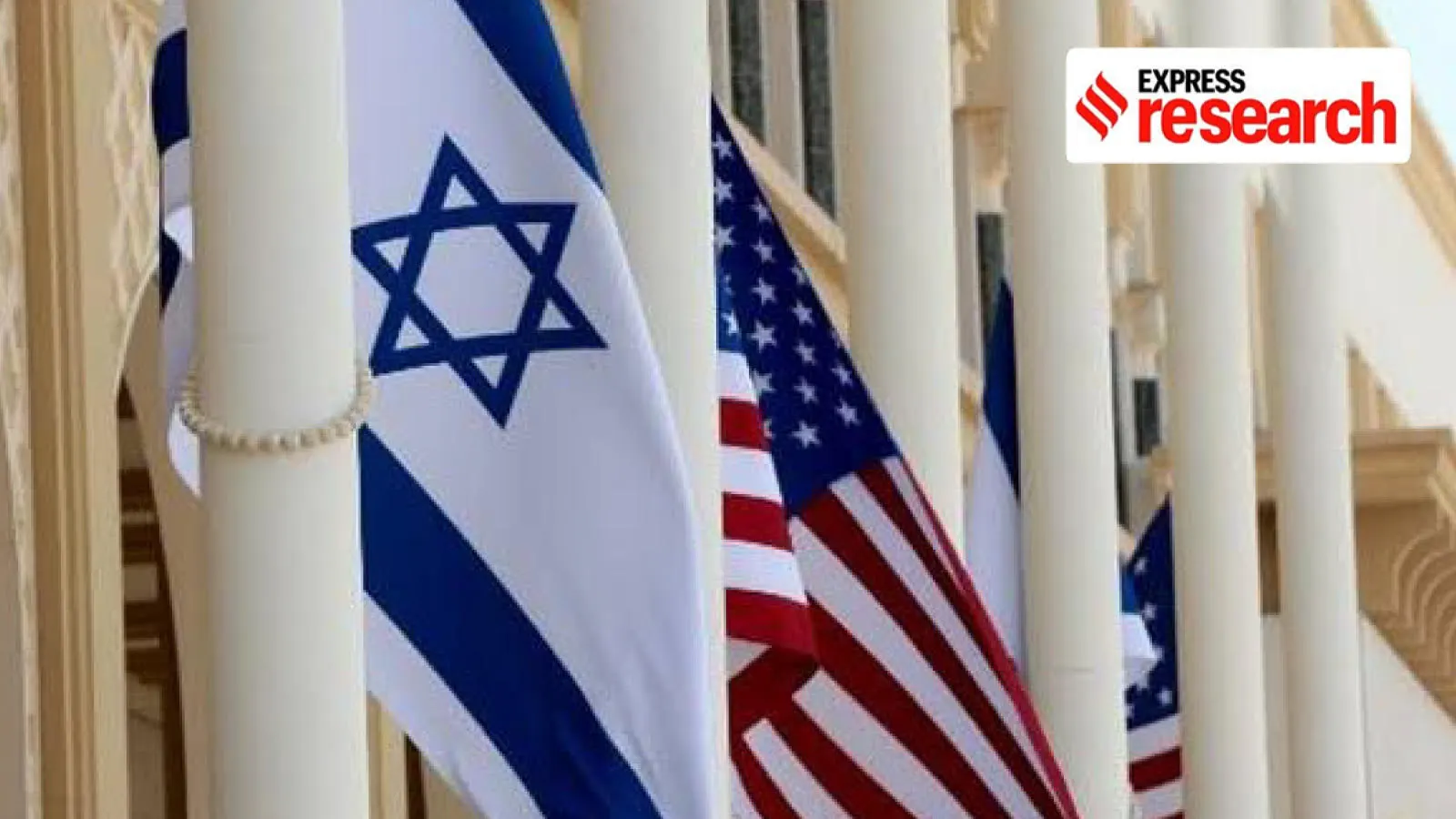Since its inception in 1948, Israel has forged partnerships with a number of strategic allies. It enjoys strong trade relationships with India and China, conducts defence deals with Russia and Germany, has a free trade agreement with the European Union, and has even normalised relations with former antagonists like Egypt and the United Arab Emirates.
However, over its short yet storied past, Israel can point to three countries with whom its associations have taken on particular significance — the UK and France, particularly during the mid-20th century, and the United States, by far its biggest ally in recent times.

The story of Israel’s alliances with Western powers is a tale of complex geopolitical relations, shifting allegiances, and enduring support. Here is a look at how those relationships came to fruition and how they have developed over the years.
Pre-1948
The seeds of Israel’s friendships were sown in 1917 with the Balfour Declaration, a significant expression of British support for a ‘Jewish National Home’ in Palestine. This declaration set in motion a series of events that led to the establishment of Israel. As the British-Israeli historian Jonathan Spyer states in the Middle East Review of International Affairs, the sympathy for Zionist aims expressed in the Balfour Declaration, above all, enabled the Zionists to build up the Jewish population in Mandatory Palestine from 55,000 in 1917 to just over 162,000 in 1929.
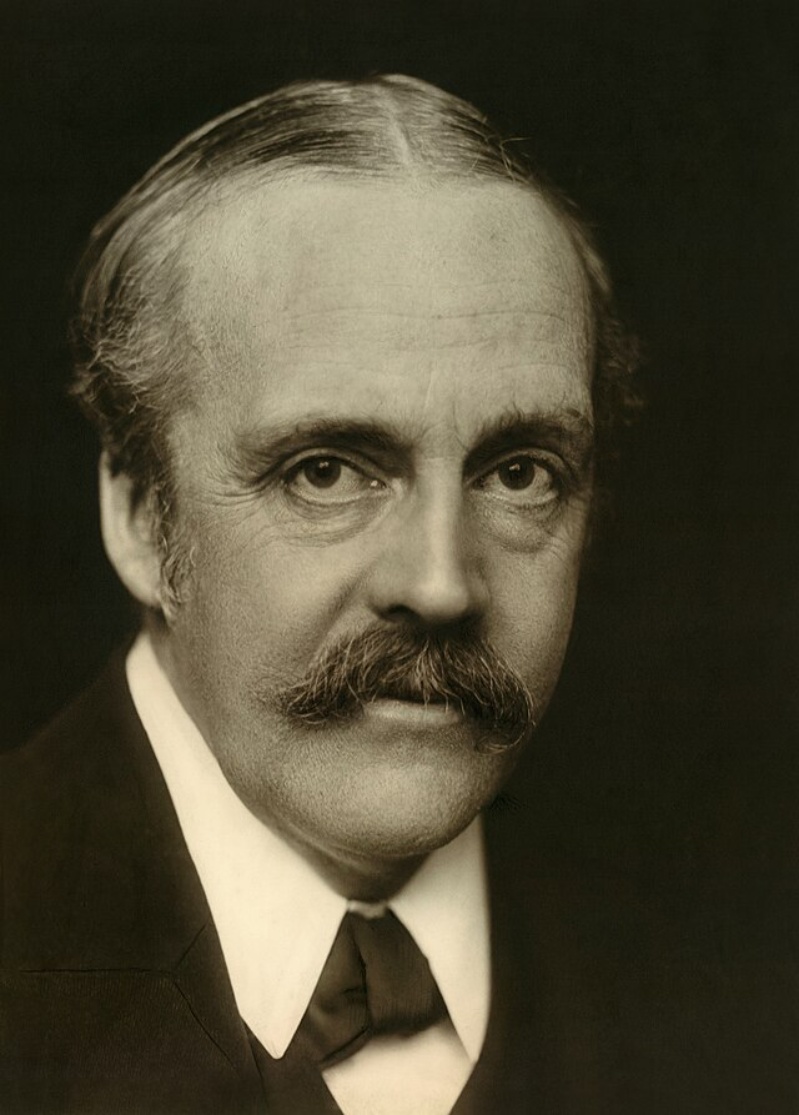 British Foreign Secretary Arthur James Balfour (Wikimedia Commons)
British Foreign Secretary Arthur James Balfour (Wikimedia Commons)
However, beginning in the 1930s, relations between the British authorities and the Jews in Palestine steadily began to deteriorate. The Balfour Declaration, a letter written by then-British foreign secretary Arthur Balfour and addressed to Lionel Walter Rothschild, the leader of the British Jewish community, was an expression of Britain’s strategic interests during the First World War, rooted in the power politics of the Middle East rather than in any intrinsic support for a Jewish homeland. In fact, as Prime Minister in 1905, Balfour signed a bill preventing Jews fleeing from persecution in Russia from coming to Britain (where conditions were scantily better).
Given these uncertain motives, when the Arab powers grew closer to Germany and Italy in the 1930s, the British were quick to reverse course, prioritising their relationships with Arab leaders over those with the Zionists. Documented by British historian Nick Reynold in The 1945-1952 British Government’s Opposition to Zionism and the Emergent State of Israel (2021), after 1929, Britain began to restrict Jewish immigration into Palestine and, under Prime Minister Clement Attlee in 1946, refused to admit 100,000 Jewish refugees, despite facing considerable pressure from US President Harry Truman to do so. However, Britain was eventually forced to concede to the demands of Washington, its refusal to back Jewish interests producing, according to Reynold, “a shocking depth of anti-British feeling in the United States.”
Also read | The bloody history behind how Israel, and Palestine, came into existence
The Labour government of Attlee, worn down economically, mistrusted by both sides, and intimidated by Jewish illegal immigration and Zionist militias, turned the issue over to the United Nations. This resulted in the UN’s partition resolution in November 1947, on which Britain abstained, and subsequently withdrew from Palestine in May 1948 against the backdrop of intercommunal conflict.
The United Nations Partition Plan for Palestine
In accordance with the United Nations Partition Plan for Palestine, a Jewish state was formally established within formerly British Mandated Palestine on May 14, 1948. The United States extended de facto recognition to Israel within 11 minutes of its creation. On May 17, 1948, the Soviet Union became the first nation to officially recognise Israel. Nicaragua, Czechoslovakia, Yugoslavia, and Poland subsequently followed suit. The United States granted de jure recognition to Israel after the first Israeli election in 1949.
However, the Arab states were vehemently against the UN Partition Plan and attacked Israel less than 24 hours after it had declared its independence. The subsequent Arab-Israeli War ended in a stunning victory for the newly-formed Jewish state but, contrary to popular opinion, failed to galvanise ardent support from the West. In Israel’s Moment (2022), University of Maryland professor Jeffrey Herf argues that in the initial days of the Arab-Israeli War, the US and Britain were afraid to alienate the Arab states (and drive them into the arms of the communists,) viewing the Zionist Project “as a hindrance to the British Empire and then to American Power in the Middle East.”
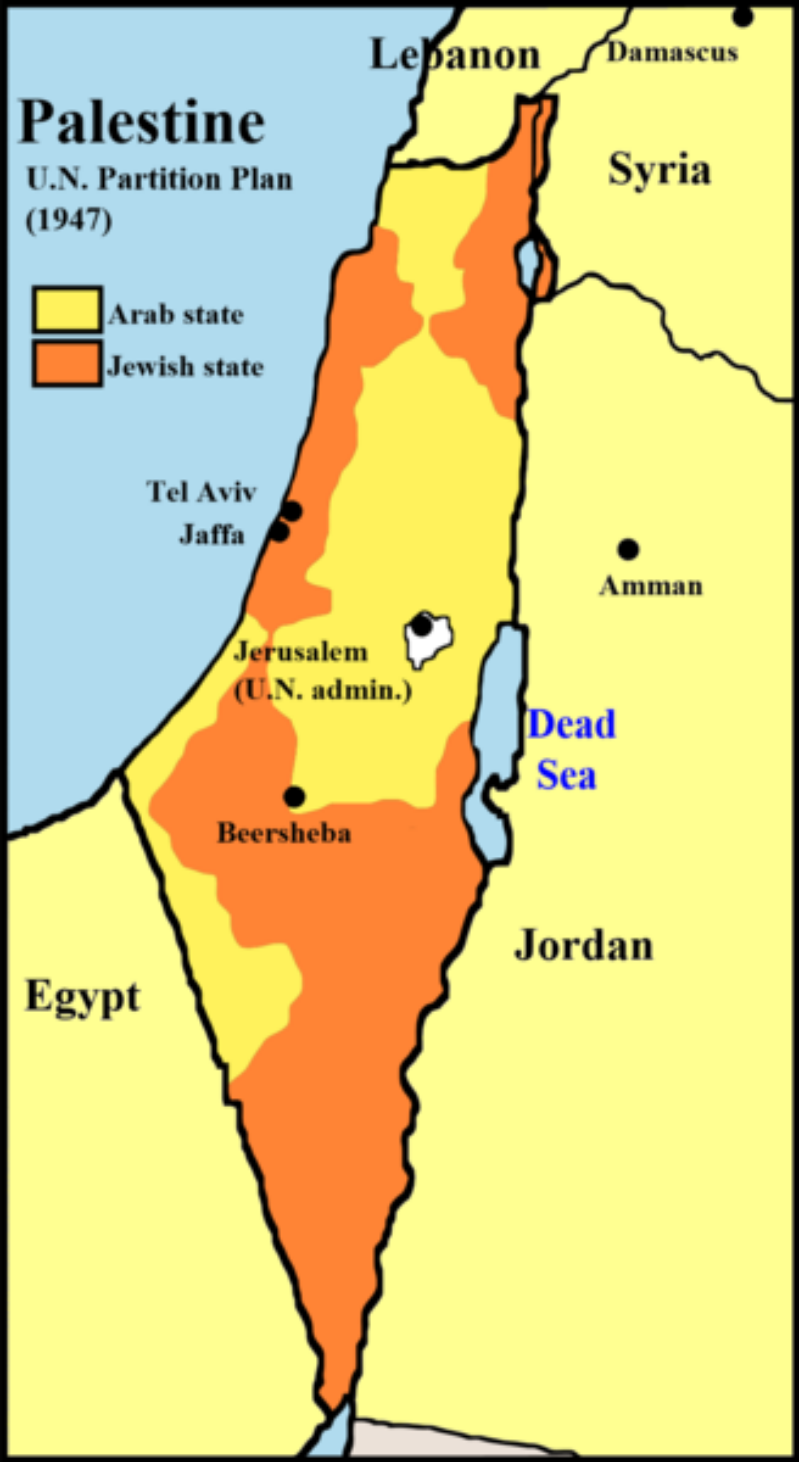 UN Partition Plan for Palestine (Wikimedia Commons)
UN Partition Plan for Palestine (Wikimedia Commons)
Herf states that the Soviet Union provided more support to Israel during its foundation than the United States, and it was the Soviet puppet states that advocated for Israeli statehood at the United Nations. At the end of the war in 1949, Israeli Prime Minister David Ben-Gurion adopted five principles to guide Israeli foreign policy, chief amongst them being “friendship with all peace-loving states, especially in the United States of America and the Union of Soviet Socialist Republics.” But, according to Herf, by then anti-Semitism was on the rise in the USSR, and America was cooler towards Israel than Ben-Gurion hoped. Ironically, it was France, with its long history of anti-Semitism that became Israel’s biggest ally.
After the Nazis invaded France during the War, the Vichy government, or the French government in exile, continued to manage civil administration until 1942, from its headquarters in Southern France. The Vichy government was recognised by every Allied power and was considered to be a bulwark against the Germans in Nazi occupied France. However, according to the BBC, the Vichy government, independent of German influence, was ideologically and practically anti-Semitic. By the end of the War, it is estimated that the Vichy regime had helped deport over 75,000 Jewish refugees to death camps.
However, faced with the rising threat of communism and the collapse of its colonial empire, the French saw Israel as a natural ally in the Middle East, and began to supply the state with advanced weaponry. France’s relationship with Israel would endure for two decades, its pinnacle being during the Suez Crisis of 1956.
The Suez Canal Crisis
Between the foundation of Israel in 1948 and the Suez Crisis in 1956, Britain had attempted to maintain relations with both Israel and the Arab states of Transjordan and Egypt. However, in the 1950s, Britain’s status as a great world power was rapidly declining. Both the UK and France were facing anti-colonial headwinds and had lost most of their territories in Asia and the Middle East. During this time, Egyptian President Gamal Abdel Nasser was increasingly amplifying his anti-imperialist sentiment and was determined to expel the British and the French from the region.
Matters came to a head in July 1956, when Nasser decided to nationalise the Suez Canal, dealing a major blow to Britain and France which had a controlling interest in the revenues generated by trade through the Suez Canal. Soon after Nassar’s declaration, Britain and France allied with Israel to regain control of the Suez Canal, marking it the first time that Britain and Israel cooperated against a common enemy.
While Israel’s victory included the capture of the Sinai Peninsula between October 29 and November 5, 1956, the Anglo-French involvement proved unsuccessful. To their surprise, Britain and France faced an unexpectedly harsh Soviet response to their intervention at Port Said, west of the Suez, and, more crucially, encountered the rebuke of US President Dwight Eisenhower, who demanded they leave the Canal.
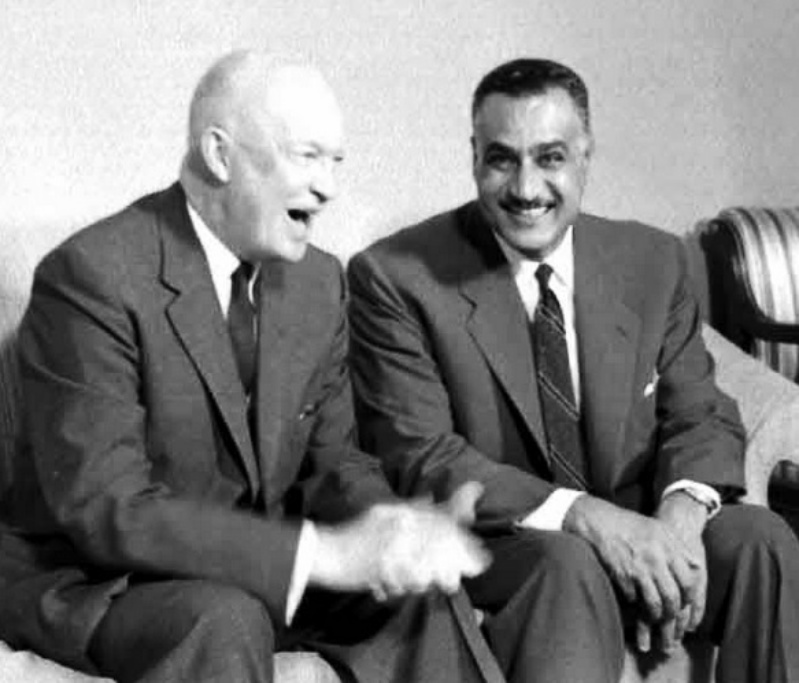 Presidents Eisenhower and Nasser meeting in New York, 1960 (Wikimedia Commons)
Presidents Eisenhower and Nasser meeting in New York, 1960 (Wikimedia Commons)
The US believed that if American soldiers were required to support the British and French, the conflict would drive Arab governments to form agreements with the Soviet Union. In addition, the US did not want to look hypocritical after denouncing the Soviet Union for its intervention in Hungary, nor did it want to be perceived as supporting two aggressive colonial powers in an era of decolonisation. The US would continue to maintain a strained relationship with Israel over the next decade, with Eisenhower’s successor John F Kennedy criticising Israel in 1963 for not being forthcoming about its nuclear programme.
However, the Suez Crisis marked a turning point in how Israel was perceived by the West. Until that time, the survival of the Jewish state was seen as an uncertainty, but after the conflict, it became evident that the Jews possessed the premier military force in the region. According to Spyer, for Britain, this meant that the maintenance of a strong Israel became an interest and sparked the beginning of arms partnership between the two countries.
However, Israel’s arguably biggest victory against a coalition of Arab states in 1967 would also diminish its relationship with its two biggest allies in Britain and France.
The Six-Day War and the collapse of French and British support
According to Moshe Gat, Professor of Political Studies at Bar Ilan University in Tel Aviv, from the end of the Suez campaign until the outbreak of the Six-Day War in June 1967, Israel and Britain enjoyed a warm relationship underscored by arms deals and diplomatic support.
After the War of 1967, Britain feared that its support for Israel would damage its relationship with the rest of the Middle East. At the United Nations General Assembly that year, the British Foreign Secretary George Brown delivered a speech in which he demanded Israel’s evacuation from the Occupied Territories, warned it not to annex East Jerusalem, and asked the state to account for the future of Palestinian refugees. In the article, Britain and Israel After the Six Day War, Gat writes that Brown’s speech was seen as a “betrayal”, signalling the onset of Anglo- Israeli tension, “with Britain and Israel finding themselves on opposite sides of the debate on practically every issue on the Middle East agenda.”
Similarly, after France exited North Africa in 1962, its shared strategic interest against Arab nationalism began to decline. During most of the 1960s, France attempted to balance its longstanding partnership with Israel with its improving relationship with Arab nations. However, according to journalist Gary Bess, in a 2010 article for The New York Times, this double game ended during the Six-Day War when France was forced to pick a side, and “in a shock to its Israeli allies, it chose the Arab states.” For the remainder of the War, France would impose an embargo on Israel, severely limiting its military capabilities.
Also read | Zionism: How a movement opposed by most Jews spawned the idea of Israel
Although Britain’s relationship with Israel would improve over time, the once solid Anglo-French partnership would remain forever tainted. In a report titled France’s Fascination with Israel and Palestine (2014), Myriam Benraad of the European Council on Foreign Relations, states that French citizens, especially its burgeoning Muslim population would increasingly adopt an anti-Israel view in the decades following the Six-Day War. “Anti-Zionism,” she writes, “which is sometimes just a cover for anti-Semitism, is widespread within French society.”
However, just as Israel lost two allies, it gained arguably an even more important one. As the late Israeli historian Uri Avnery wrote in a 2016 article titled The Saga of Sisyphus, “I had forecast that once the Algerian War was over, France would drop Israel like a hot coal and renew its ties with the Arab world. And that, of course, is exactly what happened – Israel adopted the US instead.”
The special relationship
Although president Kennedy first emphasised the ‘special relationship’ between Israel and the US in 1962, it was only after 1967 that the partnership really began to take root. During the Six-Day War, the US, already preoccupied with Vietnam, was concerned that the destabilisation of the Middle East would result in a Cold War proxy battle. Not wanting to get involved, but also fearful of losing ground to the Soviets, Washington was desperate for a quick resolution to the conflict, which, as the name suggests, Israel delivered on.
In a 2023 interview with Vox, Joel Beinin, professor of Middle East history at Stanford University, states that for the US, it was crucial that Israel defended itself in a timely manner without any American assistance. This, he notes, signalled to the US that “these guys are good. We are in a mess in Vietnam. Let’s be connected to them.” That relationship would be cemented by President Richard Nixon in 1973, when he declared his full-fledged support for Israel during the Yom Kippur War, ordering his Secretary of State, Henry Kissinger, to “do whatever it takes” to save Israel.
Later, Ronald Reagan would acknowledge the shared strategic partnership between Israel and the US, especially in context of the Cold War, stating that “only by full appreciation of the critical role the State of Israel plays in our strategic calculus can we build the foundation for thwarting Moscow’s designs on territories and resources vital to our security and our national well-being.”
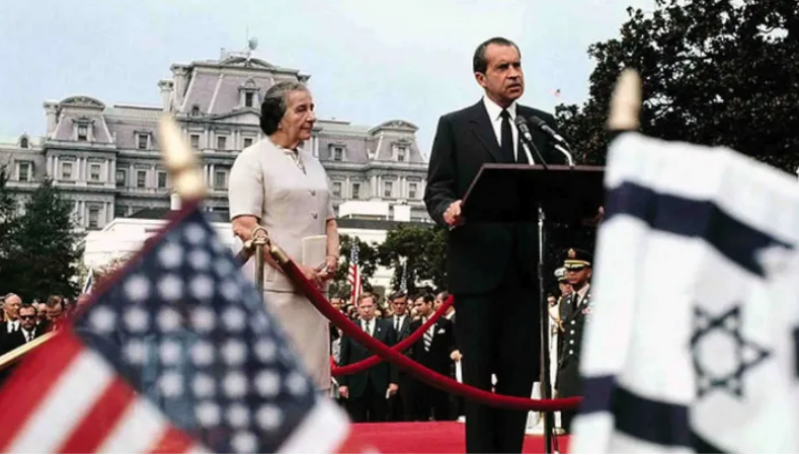 Israeli Prime Minister Golda Meir, left, with President Nixon in Washington, D.C., in 1974. Nixon’s plan to aid Israel was called Operation Nickel Grass. (Universal History Archives)
Israeli Prime Minister Golda Meir, left, with President Nixon in Washington, D.C., in 1974. Nixon’s plan to aid Israel was called Operation Nickel Grass. (Universal History Archives)
Initially, the US both gave and sold Israel most of their weapons and provided loans at below-market rates from US banks to fund their development initiatives. The two nations then started working together on weapon development and manufacture in the 1980s and 1990s. Additionally, in 1999, the US signed the first of three 10-year memorandums agreeing to contribute billions in military aid annually to Israel, as President Bill Clinton set out to foster sustainable peace between Israel and its Arab neighbours.
The enduring relationship between the two continued under Presidents George Bush and Barack Obama, reaching a zenith under the Donald Trump administration when the US officially recognised Jerusalem as the capital of Israel. Although public opinion in the US has shifted since the Arab Spring, the alliance remains of paramount importance to policy makers in Washington.
Most Read 1Qatar hands death penalty to 8 former Indian Navy men, Govt explores legal options 2Leo box office collection Day 8: Vijay-starrer aims to beat Jailer’s Rs 600 crore record, still has a long road ahead 3Deepika Padukone says she and Ranveer Singh were ‘technically allowed’ to date other people ‘until he proposed’: ‘There was no real commitment’ 4How much 50 over cricket domestically has Virat Kohli played: Nasser Hussain tears into England after they lose to Sri Lanka 5Ranveer Singh, Deepika Padukone kept on kissing even as a brick came through the window during Ram-Leela: ‘We didn’t break liplock’
It is hard to underscore the depth of unconditional support that Washington has provided to Tel Aviv in recent years, with military funding totalling roughly $4 billion per year. During the most recent crisis alone, the Pentagon has sent Israel a carrier strike group, four destroyers, the largest US warship in the USS Gerald Ford, F-35 fighters, guided missile carriers and an incoming aircraft carrier that is larger than three football fields laid end to end.
According to the Council on Foreign Relations, an American think tank, Israel’s diplomatic relations “now span the globe,” a development that represents a massive achievement for the state. Israel’s global significance was demonstrated by world leaders in reaction to the 2023 Israel-Hamas conflict when heads of states including from Canada, India, the UK, France, and Germany affirmed Israel’s right to defend itself from attack. While some Arab states have backed Hamas, most — in a dramatic U-turn from their policies in the 20th century — have issued a moderate response, urging both sides to end the violence. However, even without the rest of the world, Israel is bolstered by the support from its biggest ally.
Also ReadWhy Sanskrit has strong links to European languages and what it learnt in…A short history of the Sardar Sarovar Dam on river NarmadaHere is everything you need to know about Indian JewsWhy Islamic State in Afghanistan harks on the concept of Khorasan and wha…
As US Secretary of State Antony Blinken told Israeli Prime Minister Benjamin Netanyahu earlier this month, “you may be strong enough on your own to defend yourself. But as long as America exists, you will never ever have to. We will always be there by your side.”
© IE Online Media Services Pvt Ltd


